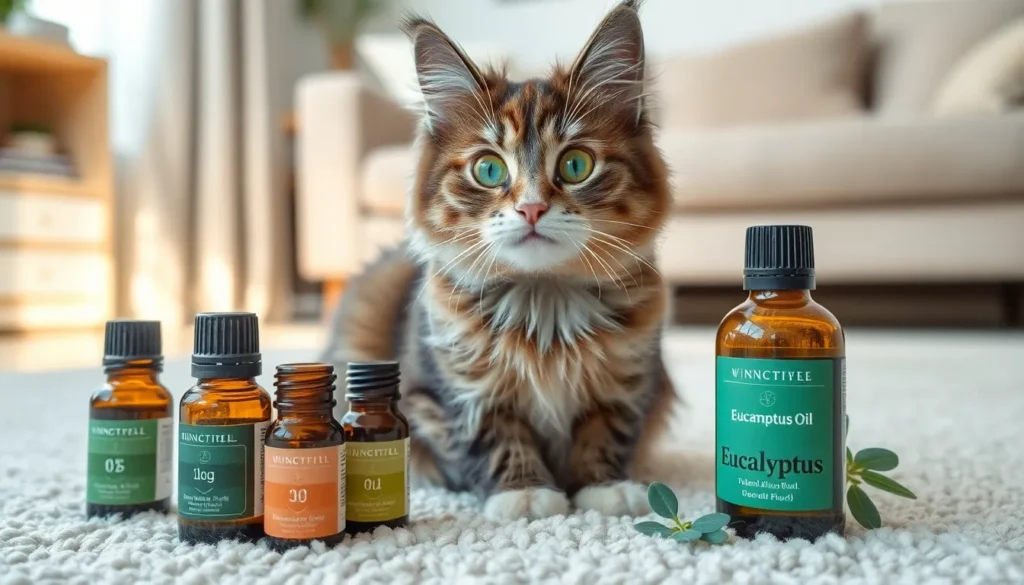Eucalyptus oil has earned a reputation as a natural remedy for everything from colds to cleaning, but what about our furry friends? If you’ve ever watched your cat eyeing your essential oil collection like it’s a gourmet buffet, you might wonder if eucalyptus is on the menu. Spoiler alert: it’s not as safe as it sounds.
Table of Contents
ToggleUnderstanding Eucalyptus Oil
Eucalyptus oil is derived from the leaves of the eucalyptus tree, commonly known for its medicinal properties. Concerns arise regarding its safety for pets, especially cats.
Origin and Uses
Eucalyptus trees primarily grow in Australia, though some species are found in other regions. This oil gained popularity for its antiseptic, anti-inflammatory, and decongestant properties. Many individuals use eucalyptus oil in aromatherapy, household cleaning products, and insect repellents. Studies show its effectiveness in promoting respiratory health and soothing muscle pain. Despite these benefits, feline sensitivity to eucalyptus oil warrants caution when used around cats.
Key Components
Eucalyptus oil contains various compounds, including eucalyptol, alpha-pinene, and limonene. Eucalyptol serves as a primary ingredient, contributing to its characteristic scent and therapeutic effects. Alpha-pinene has potential anti-inflammatory benefits, while limonene provides some antimicrobial properties. These components offer advantages to humans but can pose health risks to cats. Exposure may lead to symptoms such as vomiting, diarrhea, or lethargy. Understanding these elements is crucial for safeguarding feline well-being.
Safety Concerns for Cats

Eucalyptus oil presents several safety concerns for cats. Understanding the potential risks associated with its use is essential for pet owners.
Toxicity Levels
Toxicity levels of eucalyptus oil can vary based on the amount ingested or inhaled. Studies indicate that even small amounts of eucalyptus oil can be harmful to cats. Key components like eucalyptol can lead to adverse reactions. Cats exhibit higher sensitivity compared to other animals, making exposure particularly risky. Veterinary professionals often recommend avoiding any eucalyptus products entirely. Ensuring a cat’s environment is free of eucalyptus oil protects against possible toxicity.
Symptoms of Eucalyptus Oil Exposure
Symptoms of eucalyptus oil exposure in cats include gastrointestinal distress and respiratory issues. Vomiting and diarrhea are common indicators of ingestion. Symptoms may also manifest as lethargy or lack of coordination. Some cats show signs of salivation or difficulty breathing, which require immediate veterinary attention. Noticing any unusual behavior after exposure should prompt an evaluation by a veterinarian. Prompt action can mitigate severe health consequences, emphasizing the importance of monitoring cats closely.
Expert Opinions
Veterinary professionals widely regard eucalyptus oil as unsafe for cats. Numerous veterinarians advise against its use in households with felines to avoid potential health risks. Symptoms such as vomiting, diarrhea, and lethargy often arise after exposure to eucalyptus oil. Some veterinarians note that even minimal amounts can lead to adverse effects. Monitoring cats after potential exposure becomes essential to identify any signs of distress.
Veterinarian Insights
Veterinarians emphasize the unique sensitivity of cats to eucalyptus oil. Veterinary experts frequently recommend using alternative products that are known to be safe for cats. They assert that the risks associated with eucalyptus far outweigh any perceived benefits. Common symptoms reported include gastrointestinal upset and respiratory issues. Seeking immediate veterinary attention is crucial if a cat displays unusual behaviors like excessive drooling or difficulty breathing.
Toxicology Research
Research indicates that components in eucalyptus oil, such as eucalyptol, can be toxic to cats. Scientific studies confirm that ingestion or inhalation of eucalyptus oil can lead to various health complications. Toxicology reports reveal that felines metabolize certain substances differently than other animals, increasing their susceptibility. Incidents of toxicity from eucalyptus oil prompt calls for awareness among pet owners. Understanding these findings helps pet owners make informed decisions about household products.
Alternatives to Eucalyptus Oil
When considering safe options for cats, several alternatives exist that offer benefits without the risks associated with eucalyptus oil.
Safe Essential Oils for Cats
Lavender oil provides calming effects and may help reduce anxiety in cats. Another option is chamomile oil known for its soothing properties that can promote relaxation. Frankincense oil also has anti-inflammatory effects, helping with minor issues. Each of these oils should be used in moderation and properly diluted before application. Always consult a veterinarian before introducing any essential oil to ensure it aligns with individual pet needs.
Other Natural Remedies
Catnip serves as a natural alternative that many cats enjoy. It can enhance mood and stimulate playful behavior without any side effects. Similarly, valerian root offers a safe option for relaxation and stress relief in cats. Consider using natural herbs such as these to improve your cat’s well-being. Herbal remedies may not only be effective but also promote a healthy environment for your feline friend.
Eucalyptus oil poses significant risks to cats and should be avoided in homes with these pets. Its toxic components can lead to serious health issues even with minimal exposure. Pet owners must prioritize their cat’s safety by steering clear of eucalyptus products and opting for safer alternatives.
Veterinary advice consistently highlights the importance of monitoring for any signs of distress following potential exposure. Choosing non-toxic options like lavender or chamomile oil can provide benefits without compromising feline health. By staying informed and cautious, pet owners can create a safe and nurturing environment for their beloved companions.



